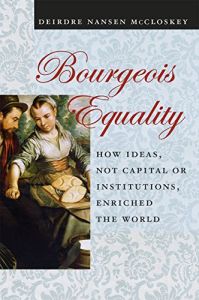Join getAbstract to access the summary!

Join getAbstract to access the summary!
Deirdre N. McCloskey
Bourgeois Equality
How Ideas, Not Capital or Institutions, Enriched the World
University of Chicago Press, 2016
What's inside?
Why, beginning in the 1700s, did Europeans and Americans experience a drastic improvement in welfare?
Recommendation
Why, beginning in the 18th century, did average citizens in Europe, and later in the United States, experience a drastic improvement in welfare? Economists and historians argue this so-called “Great Enrichment” occurred due to material reasons like imperialism or simply the “accumulation of capital.” Economist Deirdre Nansen McCloskey’s groundbreaking new book offers compelling evidence in favor of an alternate theory. She posits that the Enrichment resulted from society’s changing ideas about the middle class and their “trade-tested betterments.” McCloskey claims that the acceptance of this so-called “Bourgeois Deal” enriches societies financially and spiritually, while rejecting it brings stagnation. McCloskey’s skill in melding history, economic theory and big ethical ideas makes her arguments highly accessible. Her concern with the ways economic theory affects regular people will appeal to and challenge thoughtful readers. getAbstract recommends this tour de force to academics, sociologists and anyone interested in the currents that shape modern economic and social thought.
Summary
About the Author
Deirdre Nansen McCloskey is a distinguished professor of economics, history, English and communication at the University of Illinois at Chicago.





















Comment on this summary